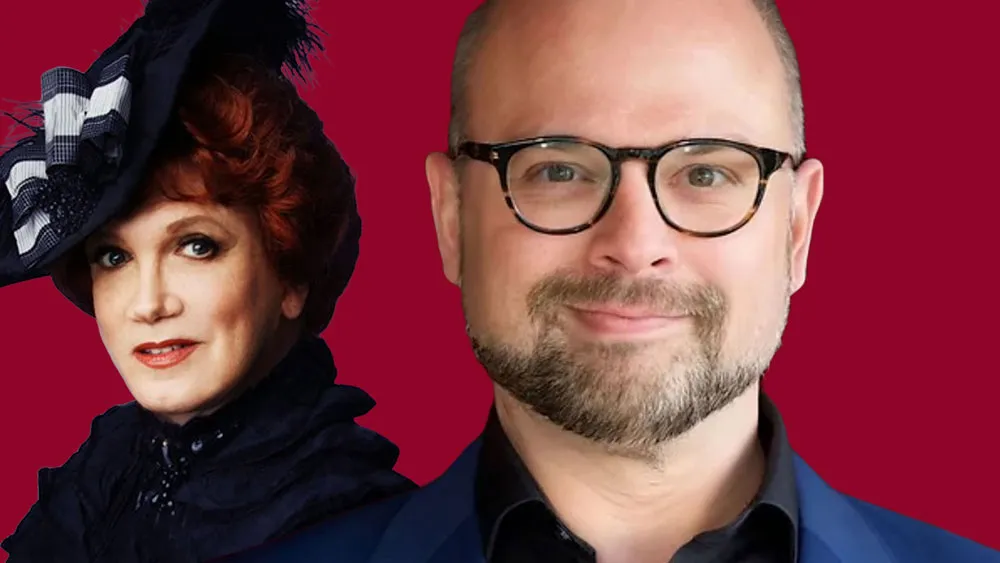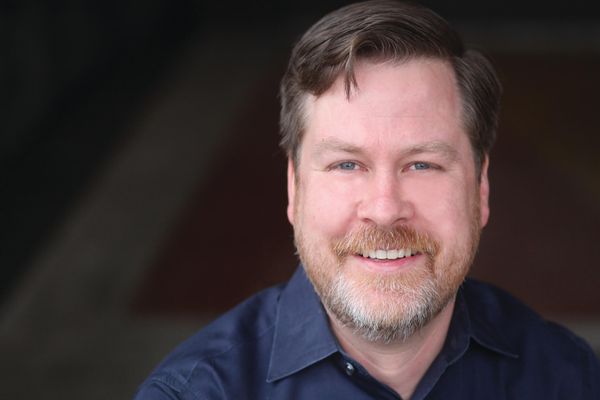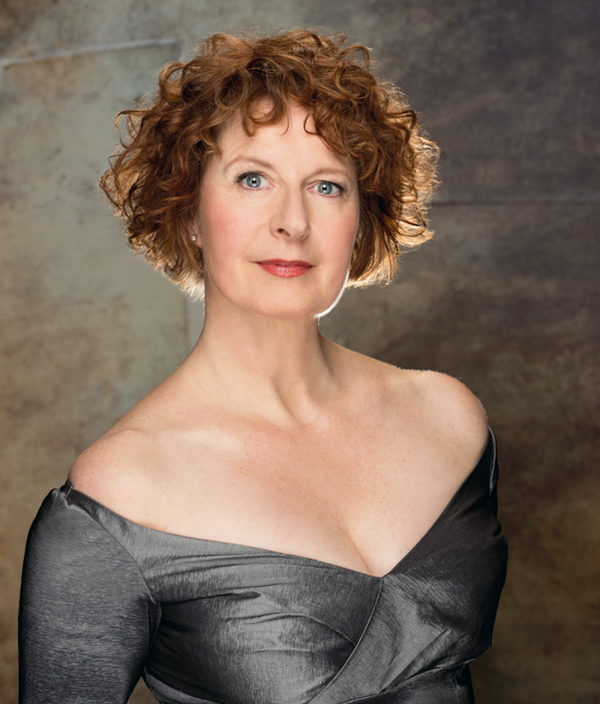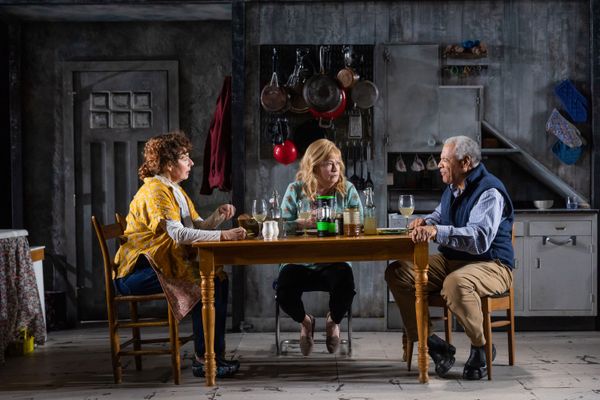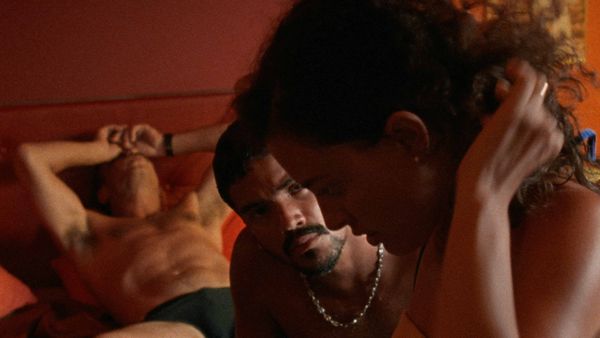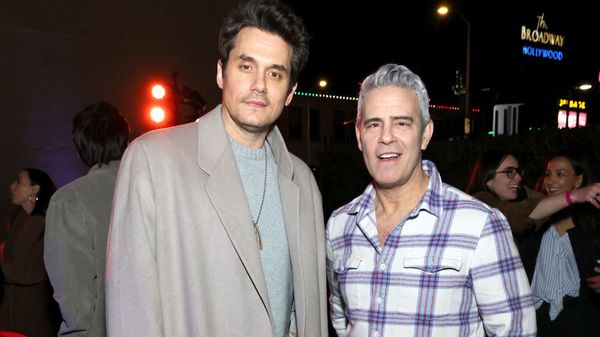
February 21, 2020
Ripped from the Headlines: Actress Paula Plum on Environmental Drama 'The Children'
Kilian Melloy READ TIME: 9 MIN.
Lucy Kirkwood's 2016 play "The Children," which is being produced by SpeakEasy Stage Company as part of their current season, imagines a pastoral English countryside that has been ravaged and irradiated by a nuclear power plant meltdown caused by an earthquake and tsunami. Two retired physicists who once worked at the power plant – a married couple, Hazel (Paula Plum) and Robin (Tyrees Allen) – have relocated outside of the danger zone, leaving behind their long-time home in the process.
It's into this troubled new world that Rose (Karen MacDonald) enters. Rose also worked at the nuclear power facility, years ago, and was friends with Hazel and Robin. Concerned about the disaster, Rose tracks the couple down to their new home. But even over and above Rose's concern for her old friends, there's something in the air – something that no Geiger counter could pick up on, yet that charges each scene.
In one way, the play's uneasiness is a result of the slightly bristling manner with which the three speak to one another. There's no formality or shyness between them, and friendly banter often takes on a crude character or veers into a sharp tone. As the evening of their reunion wears on, old resentments bubble up, still toxic despite the decades that have passed – and new disagreements start to emerge, not the least of which is the question of how the older generation – people in their sixties and seventies, people like Rose, Hazel, and Robin – might have raised a younger generation, but have not done right by them in terms of securing a sustainable future.
Where, in the perilous times these characters are living through, can they hope to land? Is there a brighter tomorrow... or nothing more than a conflagration they failed to contain?
EDGE had the pleasure of catching up, once again, with Paula Plum to hear her thoughts on the play's many layers of emotional and narrative mystery, the state of the world around us, and the joys of being a storyteller on the stage.
EDGE: It's been a while since we have spoken! What have you been up to?
Paula Plum: I direct a concert every year for WGBH called "Christmas Celtic Sojourn" – I've been doing that for 17 years; I'm the director of that production, with Brian O'Donovan. We tour five cities, so that occupies my winter. And now I'm preparing for this.
EDGE: That's a lot!
Paula Plum: It's pretty intense.
EDGE: "The Children" is pretty intense all by itself.
Paula Plum: It's pretty wonderful. I've been excited about this for a year!

Source: Nile Scott Studios
EDGE: The play almost has a ripped from the headlines feel about it, since it deals with the aftermath of a catastrophe that is very close to what actually happened in Fukushima, Japan, in 2011. That's a mess that's still being dealt with today.
Paula Plum: I think Lucy Kirkwood might have used those exact events to inspire her play... we've been cautioned about spoilers because there is kind of a mystery element to this play.
EDGE: It's a play that unfolds in some pretty surprising ways. To be honest, I thought at first this might be a ghost story... and actually, it sort of is a ghost story in that it's full of the effects of old, lingering resentments. That fits well with the play's more overt warning that our misdeeds today are going to haunt the people who come after us. Have you had conversations among the cast and with the director around these things?
Paula Plum: Yes, yes! I love the idea of a ghost story.
EDGE: How did you come to be cast for "The Children?"
Paula Plum: Paul actually sent me the script a year ago this January, and said they were doing this and would I be interested. I read the play and said, "Are you kidding? This play is so dense and so delicious!" There's so much subtext – there's so much to discover in the playing of it, for the actors and the audience as well.
As an actor, you love to dig. And also, I love doing plays where the audience doesn't know everything and it's not just sort of handed to them. Part of the joy of being an actor is when you tell a story, you feel there's a really palpable sense of the audience's understanding: "Oh, that's what happening! Oh!! I get it!" It's just so wonderful to be a storyteller for that reason. The reveal!
I have an anecdote about that: I was doing "Death of a Salesman" and playing Linda Loman. It was the last act and I was walking to the gravestone to say goodbye to Willy, with the dear departed Larry Coen. I walked past this elderly woman [who was in the audience] and she turned and whispered to her friend: "Is he dead?!"
[Laughter]
EDGE: How do you not break character and crack up right on stage when that happens?
Paula Plum: Well, everything happens in the audience. People die! You have to keep going.
But anyway, that's the wonderful part of acting for me – the [moment of] recognition. You feel the audience realizes something about the story.
EDGE: When we chatted last time, it was about your role in "Last Night at Bowl-Mor Lanes," which you starred in with Nancy Carroll. I want to ask you the same question I asked then, only this time about Karen MacDonald: Was there any thought that maybe you would play Rose, instead of Karen having that role, or was Hazel always the role they had in mind for you?
Paula Plum: You know, it's weird: I read the play and I thought of myself as Rose as I was reading it, and Karen as Hazel, because she's so funny. And it's one of those things: How does the director feel? [Speakeasy Stage Company Artistic Director] Paul Daigneault saw it the reverse, and I think [director] Bryn [Boice] also saw it that way. It could go either way. It's like when we did "No Exit" – Karen and I could have reversed roles. She was Estelle and I was In�z; she was the hyper-feminine, silly one and I was the dark, treacherous one. All of us have all of these elements inside, so I don't know – it's really a matter of how the director sees you.
EDGE: Both those characters – and also Rose's husband Robin, played by Tyrees Allen – are nuclear physicists. Did you study up on nuclear physics for this role?
Paula Plum: God, no!
[Laughter]
Paula Plum: Can I tell how hard it was just to learn to score a bowling game [for "Last Night at Bowl-Mor Lanes"]?
[Laughter]
Paula Plum: I did learn about neutrons and radium-235 nuclei because there's the paragraph in the script where Hazel is explaining how nuclear fusion works, but, um, no. I did a little bit of reading in Wikipedia, but I did not take a course at MIT. Meryl Streep might do that, but not I!
EDGE: You might if you were cast in "Copenhagen."
Paula Plum: Oh, the Michel Frayn [play]... That is the most difficult script to memorize, for that exact reason. It's inscrutable. You really have to know what you're saying, and so you really have to understand. Karen did that show at the A.R.T.
EDGE: That was a wonderful production... Speaking of technical challenges, "The Children" is set in Britain and it has British characters, so you must be polishing up your accents in rehearsal.
Paula Plum: We're actually working in three different dialects. Rose – Karen's character - has spent the last 15 years in America. We don't know about Hazel and Robin, but Hazel says she's lived here nearly all of her adult life, so I've been kind of working on a broader Yorkshire dialect, as opposed to what you'd call RP ["Received Pronunciation," or "BBC English"], which is the proper British dialect. I'm doing more of a Fiona Hill – from the impeachment hearings.
[Laughter]
Paula Plum: She has that – [Demonstrating:] broad Northern dialect, you know. It's not the proper Noel Coward type of thing, you know!
EDGE: I get the feeling that Hazel is pretty old school: She's conservative – not in the sense of actually wanting to conserve anything, but rather in wanting to cling to the familiar, even if it doesn't work very well. Is that your interpretation of where Hazel is coming from?
Paula Plum: I think that she's a creature of habit because it serves her survival. And especially now [after the catastrophe], those habits become crucial, because survival is so important. I think she is conservative in that she's had to juggle this career as a nuclear physicist and having four children. She even has a speech about raising four children and making sure that they were well taken care of, and I don't think she ever had the time to be anything but rather rigid in the structure of her life.

Source: Nile Scott Studios
EDGE: What also makes sense for all these characters is that they are, as we would call them in America, "Baby Boomers."
Paula Plum: Oh yeah, they are – they are. It's interesting to meet characters your own age when you're in your sixties! I mean, I don't need old-age makeup anymore!
[Laughter]
Paula Plum: "Oh, sixty? Sure! I can play that!" "No, Paula, you are that!"
[Laughter]
EDGE: Here you are, at an age with your character, and these characters are... I mean, the Baby Boomer cohort, in general, is starting to get a little flack from younger generations, and getting called on the carpet a bit for not having been very good stewards of the environment, or the economy, or anything that we're leaving to them.
Paula Plum: I think that there's a dichotomy because I think that our generation also... I mean, there are two extremes, like there are generally in our country. I think that this is also true in the UK, that you have extreme conservationists and then you also have extreme non-environmentalists who are part of the disposable culture, who just buy things and then throw them away. It's always shocking to me to meet people who don't conserve or recycle or re-use, or think of ways to help save the planet. In the theater, there's a movement now to take care of the environment and to be a conservationist. But that doesn't in some places – you go into buildings and find that they don't have recycling bins. It shocks me. I think it's [the case that] everywhere there's a split right down the middle between people who are aware of the fact that we are in a crisis, and people who aren't.
EDGE: So, it's not a matter of malice, really, but ignorance?
Paula Plum: I think it's now willful ignorance.
EDGE: Yeah... you have to work pretty hard to be ignorant at this point, don't you?
Paula Plum: Yeah – and uncaring! Like, "It doesn't concern me." I find that really disturbing and selfish.
EDGE: How would you feel about a "Green New Deal" – or how would Hazel feel about it, for that matter?
Paula Plum: Hmmm, that's a good question! I think Rose probably would. Rose seems to be the one who's the activist. I think that the play is structured in such a way that you understand how Hazel is somebody who has had her nose to the grindstone all her life. Hazel seems to be one of these worker ants, and I think Rose has been at liberty, and she's just been more – she's more widely traveled, she has a world view that is a little more aware of the global situation. She's the one who comes in here and starts agitating for [definitive action] to take care of the mess that we made. I don't think it's even occurred to Hazel that it's her responsibility, That's part of the crisis of the play – and I have that line, "I don't know how to want less." Right? "I don't want to give up anything." That is really it, isn't it? We have to give things up in order to take care of the world. A few of us just don't want to do that. People don't want to give up the conveniences we've gotten used to over the last fifty years. I think that's [a perfect summary]: "I don't know how to want less." It's what we have to look at.
EDGE: What have you got coming up next?
Paula Plum: Richard [Snee, Paul's husband] did a play a couple of years ago called "She Did All That," which is a documentary play about the life of Betty Ford – it compiles her speeches, and her interview with Morley Safer, and a bunch of other actually pieces of documentation. We're doing that play at the Gerald R. Ford Library [in Ann Arbor, Michigan] in May. We're really looking forward to that – I have cousins in Michigan, so they'll be coming and we'll have a little family reunion!
"The Children" runs Feb. 28 – March 28 at the Calderwood Pavilion at the Boston Center for the Arts. For tickets and more information, please go to https://www.speakeasystage.com/the-children/
Kilian Melloy serves as EDGE Media Network's Associate Arts Editor and Staff Contributor. His professional memberships include the National Lesbian & Gay Journalists Association, the Boston Online Film Critics Association, The Gay and Lesbian Entertainment Critics Association, and the Boston Theater Critics Association's Elliot Norton Awards Committee.

